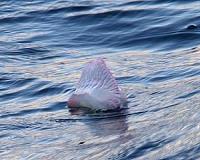| . |  |
. |
Washington (AFP) May 27, 2011 The United States on Friday rejected calls to protect Atlantic bluefin tuna as an endangered species, saying that while it was worried about overfishing it did not fear imminent extinction. Environmental groups have repeatedly voiced concern that the global fad for Japanese food was driving the world's stocks of tuna to dangerously low levels and have sought strong safeguards to preserve the species' survival. The National Oceanic and Atmospheric Administration said it was putting Atlantic bluefin tuna on a watchlist of species at risk but would not classify it under the Endangered Species Act, which would bring legal protections. "Based on careful scientific review, we have decided the best way to ensure the long-term sustainability of bluefin tuna is through international cooperation and strong domestic fishery management," said Eric Schwaab, a senior official at the agency. He said that the United States would continue to advocate strict international quotas on the number of tuna that can be hunted to "ensure the long-term viability of this and other important fish stocks." The administration pledged to review its decision in early 2013. Clay Porch, a senior federal scientist, acknowledged that the study of tuna stocks in the Gulf of Mexico was conducted mostly before the massive BP oil spill. Porch said 2010 tuna stocks were down but that the drop could be within normal fluctuations. To be listed as endangered, a species must be found to be at threat of extinction within a definable time frame. The United States last year led a push to ban the international trade in Atlantic bluefin tuna, but the proposal was easily defeated at the UN Convention on International Trade in Endangered Species after intense lobbying against the plan by Japan and opposition by some European nations. A separate meeting of the International Commission for the Conservation of Atlantic Tunas, which groups 48 major fishing nations, decided in November to trim the catch quota only modestly to 12,900 tons in 2011. US authorities said, however, that they saw a better outlook for tuna amid the growing international attention. "The new quotas that were set forth at the last convention provide a significantly better picture, providing we have sufficient compliance, than might have existed before," Schwaab told reporters on a conference call. Senator Olympia Snowe hailed the decision, saying that an endangered listing would have jeopardized the livelihoods of fishermen in her coastal state of Maine. "Such a listing would have unilaterally penalized US fishermen, particularly the hard-working responsible fishermen of Maine, who have been properly managing this valuable resource," the Republican lawmaker said. The federal government considered the request to protect tuna after a petition by the Center for Biological Diversity, an environmental group, which said that the BP oil spill threatened tuna's breeding habitat. Catherine Kilduff, a staff attorney at the center, said that the group would review the government's findings and left open the possibility of going to court to ensure the conservation of tuna. The center has called for a consumer boycott, through which it said 22,000 people have pledged not to eat at restaurants that serve bluefin tuna. "If there is a grassroots movement to stop consumption of this species, then it will also tell political leaders that no longer can their decisions be made just based on the industry's greed to keep overfishing," Kilduff said.
Share This Article With Planet Earth
Related Links Water News - Science, Technology and Politics
 Spanish resort in jellyfish alert
Spanish resort in jellyfish alertMadrid, Spain (AFP) May 27, 2011 Authorities in the Spanish tourist hotspot of Benidorm said Friday they have reopened its beaches to tourists after removing more than a tonne of dangerous jellyfish. The authorities posted red flags on the beaches on Wednesday after strong currents brought shoals of the creatures close to the shore of the Mediterranean resort. The head of the city's department of the environment, Mariol ... read more |
|
| The content herein, unless otherwise known to be public domain, are Copyright 1995-2010 - SpaceDaily. AFP and UPI Wire Stories are copyright Agence France-Presse and United Press International. ESA Portal Reports are copyright European Space Agency. All NASA sourced material is public domain. Additional copyrights may apply in whole or part to other bona fide parties. Advertising does not imply endorsement,agreement or approval of any opinions, statements or information provided by SpaceDaily on any Web page published or hosted by SpaceDaily. Privacy Statement |